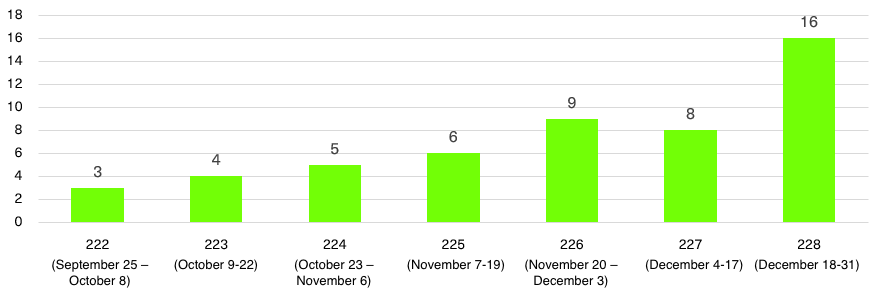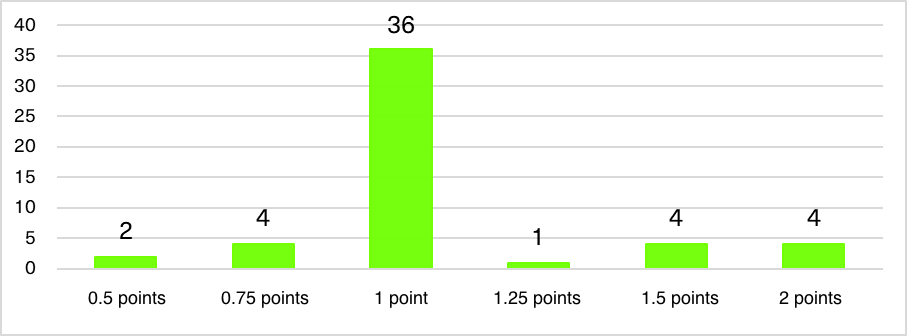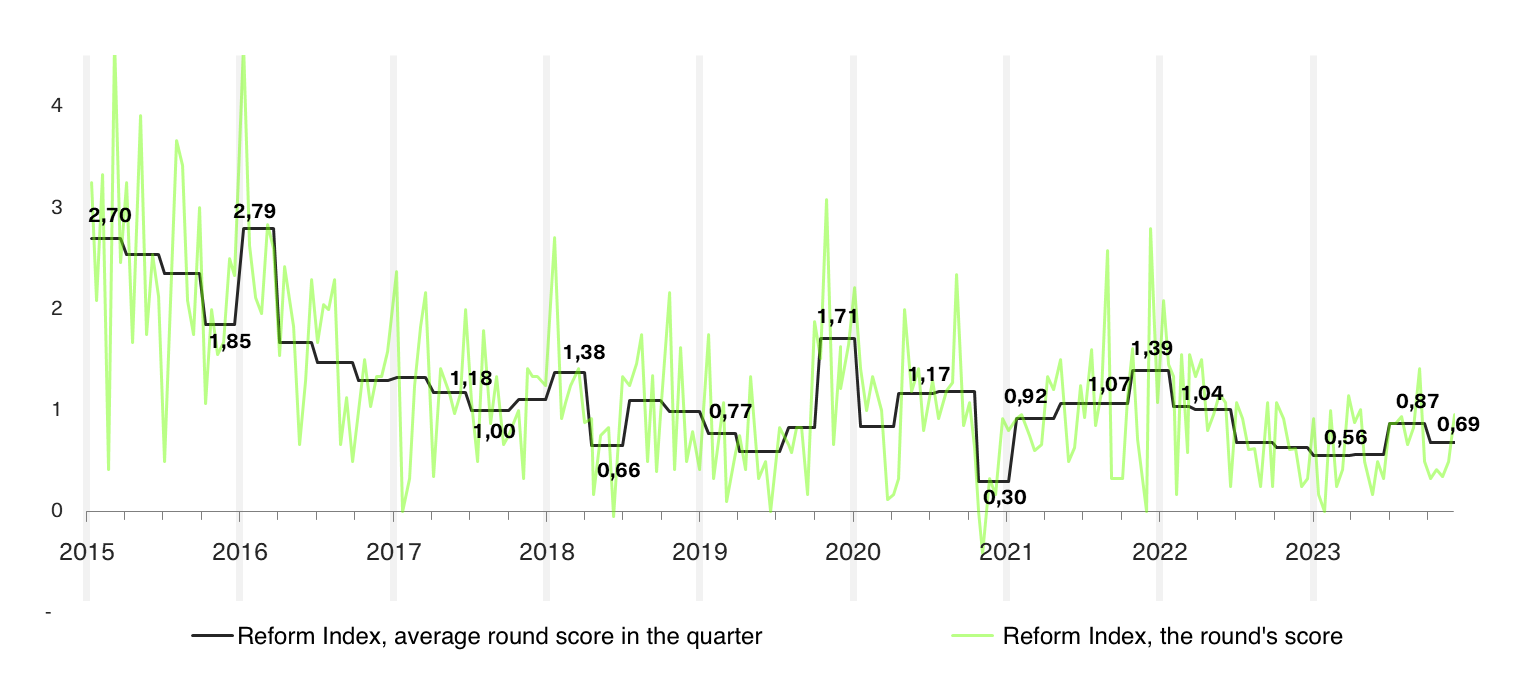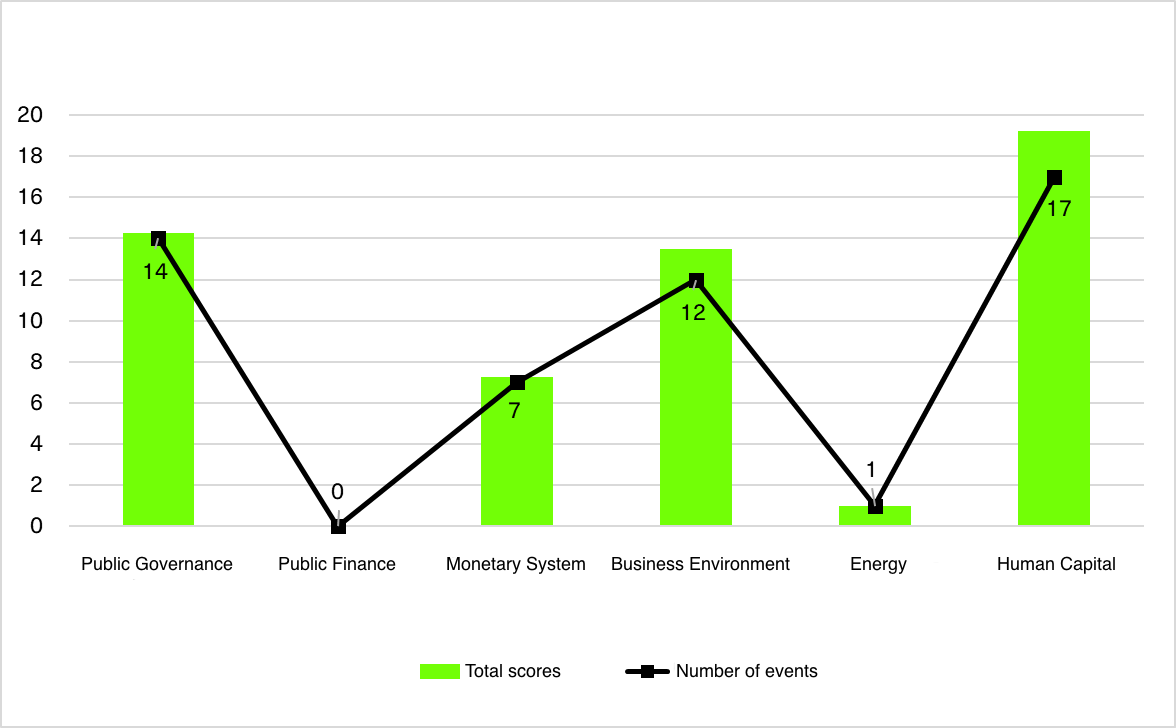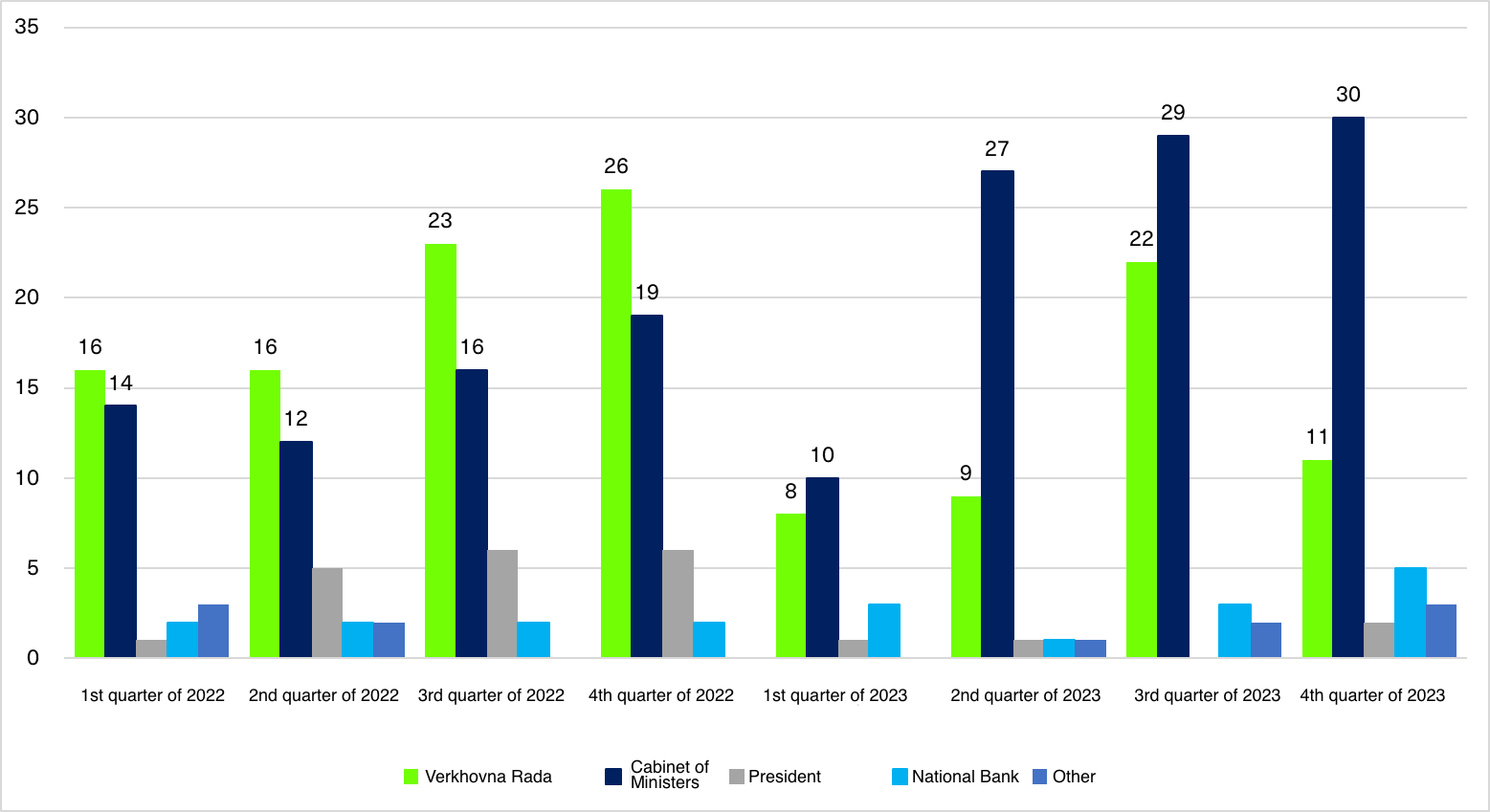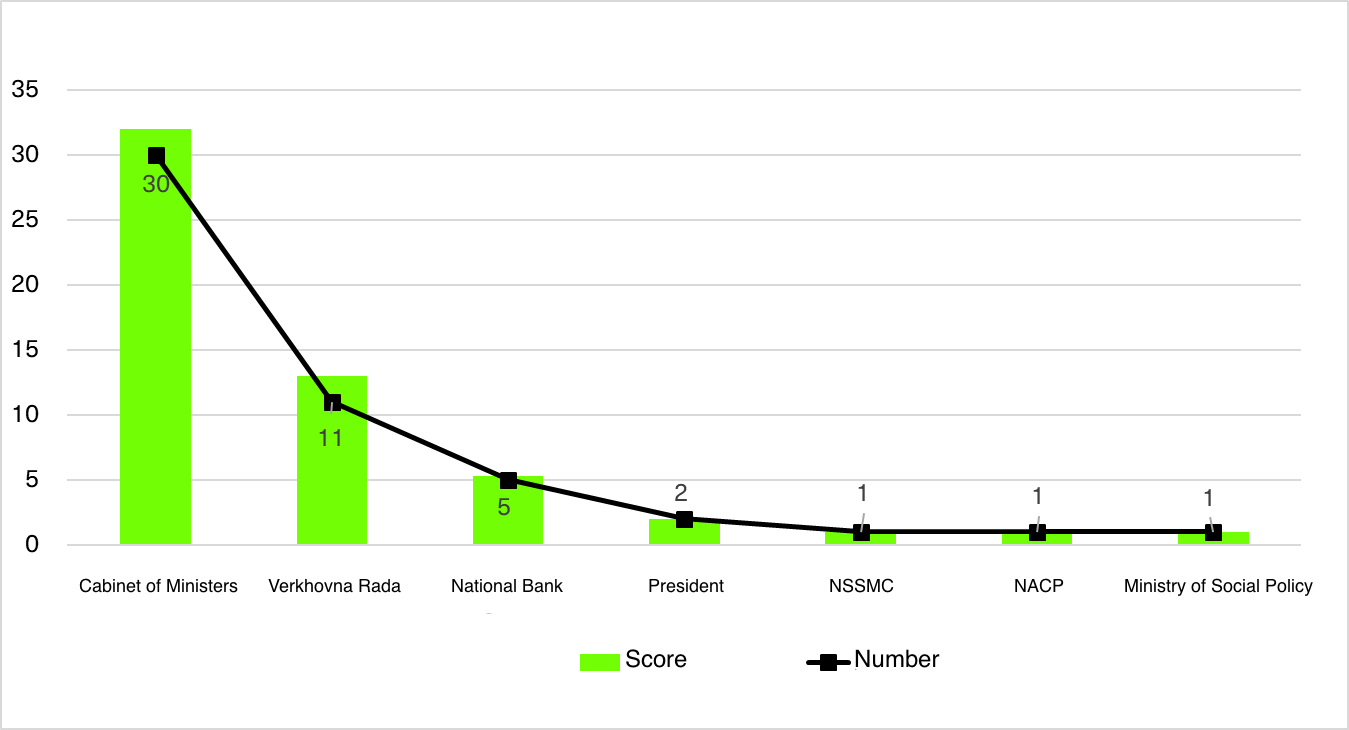Last year ended with a boost in the reformist zeal of the government. While the Reform Index counted 3-4 reforms per issue in October, the last two weeks of the year brought the country a staggering 16 significant changes—a true gift under the Christmas tree. Another positive piece of news is that we have not recorded any anti-reform efforts for the fifth consecutive quarter in the sectors we evaluate.
Chart 1. Number of reforms in biweekly rounds of the Index in the 4th quarter
Source: Issues 222-228 of the Reform Index
On the other hand, for quite some time now, no reform has surpassed the threshold of +2 points (on a scale from -5 to +5), which, in our opinion, distinguishes comprehensive influential decisions from more piecemeal ones. There could be two explanations for this: either key changes occurred earlier (such as decentralization, banking reform, implementation of public procurement), and now the government mainly seeks to refine them, or experts have started to evaluate governmental decisions more rigorously.
Chart 2. Distribution of regulations by obtained score, 4th quarter 2023
Source: Issues 222-228 of the Reform Index
As a result, the Reform Index remains relatively low.
Chart 3. Average quarterly value of the Reform Index
Source: Issues 222-228 of the Reform Index
The highest quarterly rating of +2 points was awarded to only four regulations. Two of them are laws aimed at bringing us closer to EU accession.
Firstly, the reform of the Specialized Anti-Corruption Prosecutor’s Office (SAP) continues. The new law grants it the status of a separate legal entity, thus allowing it to own property, have an account in the Treasury, and enjoy greater autonomy in building the institution. The head of SAP (also the Deputy Prosecutor General) has been given the authority to independently develop the institution’s staffing table, determine the rules for competitions for positions within it, and access state secrets of all levels of secrecy. This could significantly enhance the capacity of the anti-corruption prosecutor’s office. However, other provisions expanding SAP’s powers, such as permitting pre-trial investigations indefinitely until the suspect is notified, could also play a cruel joke.
Secondly, the government continues to improve legislation regarding national minorities, taking into account the observations of the Venice Commission. Reform Index experts positively evaluated the law that expands the rights of national minorities to education in their native language if it is one of the EU languages. National minorities will be able to receive school and vocational education in their languages, provided that integrated courses in Ukrainian language, literature, Ukrainian history, and defense of Ukraine are taught separately. Private universities are also allowed to teach in official EU languages, provided the Ukrainian language is included in the curriculum as a separate subject. Another law, which takes into account the Venice Commission’s observations, received a score of +1.5 points in the Reform Index. It allows the use of national minority languages in settlements where representatives of a particular national minority reside (comprising at least 10-15% of the population), during interactions with local authorities, in advertising, and when providing assistance and protection to members of national communities.
A high rating was given to the law that strengthens social protection for military members. Thanks to this law, monetary benefits (salary, seniority allowances, etc.) are retained for soldiers who have been captured or gone missing. These benefits can be received by immediate family members of the military personnel: husband or wife, adult children who lived with the service member, or other adult family members who were dependent on him/her.
Experts also noted a simplification for entrepreneurs — a comprehensive e-Entrepreneur service will be launched on the Diia portal, and its beta testing is already underway. Initially, e-Entrepreneur will include eight services related to the basic aspects of starting a sole proprietorship (including state registration of individual entrepreneurs, registration as single taxpayers, opening a bank account, etc.). This list of services is planned to be expanded in the future. To ensure the provision of comprehensive services to entrepreneurs, the Cabinet of Ministers has prescribed in the resolution the exchange of data between 14 registries and state systems, including the Unified State Register of Legal Entities, Individual Entrepreneurs and Public Organizations (USR), the State Register of Individual Taxpayers, the Unified Information and Analytical System of the State Employment Service, and others.
Progress by Reform Index areas
In the last three months of 2023, reforms occurred in five out of six observed sectors. In the energy sector, we recorded one reform, namely a law on the creation of reserves of oil and oil products. In the financial industry, the National Bank of Ukraine continued to work on transparency in the financial services market (new authorization procedure for providers of such services, transparent information about insurers and their services on websites, etc.) and bank resilience (implementation of a tree-tier capital system, new wage policy, etc.). Public finance, this time, remained without reforms. As for the three sectors that made the most progress, we will provide more details further in the text.
Graph 4. The sum of event scores by area, 4th quarter of 2023
Source: Issues 222-228 of the Reform Index
Human Capital
There were 17 reforms in the Human Capital sphere in the fourth quarter. Among them were two of the four most significant reforms during this period: the aforementioned changes to the law on national minorities, allowing teaching in EU languages in Ukraine, and the law on preserving financial support for captured and missing military personnel.
Several new regulations in this sphere pertain to social protection. This includes a resolution regarding financial assistance to Ukrainians who have become disabled as a result of their participation in the defense of Ukraine against Russian aggression during martial law, as well as to the family members of those who died or went missing as a direct result of their involvement in Ukraine’s defense against the Russian invasion. Additionally, access to prosthetics for people with disabilities has been simplified — now the decision regarding their need can be made by a multidisciplinary rehabilitation team (which now includes a social worker) in the hospital where the patient is being treated, rather than solely by the military medical commission (MMC), medical-social expert commission (MSEC), or medical-consultative commission (MCC). In order to streamline the work of prosthetic enterprises, a unified request form for prosthetics detailing their specifications has been introduced. Moreover, the possibility of repairing prosthetics (including those installed abroad) at the expense of the state budget has been implemented. Another important law in the sphere of social protection is the ability for military members to preserve their reproductive cells in cryobanks at the expense of the state budget. Before its second reading, a provision was added stating that such gametes would be disposed of after the death of the military personnel. This caused significant public resonance and raised the issue of the lack of regulation regarding the use of reproductive cells after the death of their owner in Ukraine. Several bills have already been registered in Parliament to repeal the provision on the disposal of reproductive cells and regulate inheritance issues related to such cells. One of them, which grants individuals the right to dispose of their own reproductive cells in the event of their death, was voted on by deputies in February 2024 and is now awaiting the President’s signature.
At the end of the year, the rules for importing humanitarian aid into Ukraine were changed. The electronic accounting system, which had been in test mode since November, was officially implemented through legislation. In the same law, the definition of what constitutes humanitarian aid was expanded. It now includes goods purchased abroad with money but imported into Ukraine as humanitarian aid and provided free of charge to recipients here—typically items such as drones, tourniquets, and similar goods. Previously, humanitarian assistance was considered only items received free of charge from a donor, both abroad and in Ukraine.
The development of the medical sphere continues. The reform of corporate governance has also reached healthcare facilities. Supervisory boards will be established in specialized hospitals owned by the state or municipalities, comprising 5-15 representatives from government bodies and the public. Importantly, the number of independent members must exceed the number appointed by the government body. This will help strengthen the capabilities of hospitals in ensuring patient rights and sustainable funding (by involving professionals from various fields in public councils).
On the other hand, to ensure quality healthcare for Ukrainians and the allocation of funds to truly capable medical institutions, the National Health Service of Ukraine (NHSU) will begin conducting both factual (document verification and hospital visits) and analytical (risk analysis based on quantitative data) monitoring of the performance of contracted hospitals.
Another step towards improving the quality of medical services is implementing continuous professional education for all healthcare professionals: pharmacists, nurses, rehabilitation specialists, and others. Previously, the system of annual training only applied to physicians, while all other specialists in the field underwent qualification enhancement courses once every five years. Now, they will have access to the latest knowledge and choose where and from whom to learn.
At the end of the year, the government approved a procedure for early detection of developmental disorders in children up to the age of 4. Early intervention services help children and their parents to compensate for identified disorders as effectively as possible, improve quality of life, and receive timely medical care or social support. This service will be available as part of the NHSU healthcare guarantees package. Minister of Health Viktor Liashko noted, citing foreign experts, that every dollar spent on early intervention saves up to 17 dollars on future treatment and educational programs. Previously, early intervention services were provided under a pilot project, but now they have become universal. Additionally, the Cabinet of Ministers adopted a decision requiring pharmacies operating in hospitals to participate in the “Affordable Medicines” program (however, this decision falls under the Business Environment direction, specifically under the “Business Regulation” sub-direction, as it imposes additional requirements on entrepreneurs).
In the field of education, a significant change has occurred for students who lived in temporarily occupied territories (TOT). Ukraine has begun to recognize the results of their education through a simplified procedure. This recognition pertains to the knowledge and skills acquired rather than the documents issued by the occupying administrations. In order to obtain Ukrainian documents for secondary or vocational education, students need to pass an assessment, which includes exams in Ukrainian history, language, and literature, as well as fundamentals of state and law. A bachelor’s degree will be recognized partially (up to 75%), while education obtained at the master’s level (except for medical and veterinary specialties) and at higher educational levels will not be recognized at all. This is intended to facilitate the continuation of schooling or obtaining professional and higher education in the government-controlled territories for students from the TOT.
Public Governance
In the fourth quarter, the government adopted 15 important regulations in this sphere. Strengthening the Specialized Anti-Corruption Prosecutor’s Office made it into the list of top reforms. However, this is not the only decision aimed at combating corruption. In the fourth quarter, the government also enhanced the powers of the National Agency on Corruption Prevention (NACP). The law proposed by the Cabinet of Ministers allowed the agency to verify the property of civil servants, judges, police officers, other officials, and their relatives, acquired even before the appointment of the official to the position. In turn, the NACP approved a procedure for monitoring the lifestyle of declarants, which will help correlate officials’ income with their lifestyle to identify corruption risks. The monitoring will be selective based on information from the media, enterprises, or citizens.
There were also changes in the career development of judges. After consultations with the High Qualification Commission of Judges, the Council of Judges, and the Public Integrity Council, the High Council of Justice is to approve unified criteria for assessing judges’ integrity and professional ethics. Candidates for judicial positions must meet the requirements of integrity and competence.
The government also focused on managing state and sanctioned property. The Cabinet of Ministers adopted a resolution on changes to the rules for selecting executives and members of Supervisory Boards for the largest state-owned enterprises. Now, professional personnel selection consultants will verify the independence and reputation of candidates for these high positions.
In order to increase transparency in the sale and leasing of property of sanctioned enterprises and individuals, it was decided to conduct this process through online auctions on Prozorro.Sale. Thanks to this, all interested parties will be able to participate in the auctions. Currently, confiscated property of legal entities can be both sold and leased, while confiscated property of individuals can only be leased. Another way to dispose of such property is to transfer it to other state bodies if it ensures effective management of corporate rights or if state enterprises will use the confiscated property to meet the needs of the Armed Forces of Ukraine. Additionally, the government limited the remuneration for state bodies managing confiscated property of the Russian Federation — it should not exceed 5% of the net income from these assets. After deducting this remuneration and compensation for the manager’s expenses, the rest of the income will be transferred to the state budget.
Another important decision was the adoption by the Ministry for Communities, Territories, and Infrastructure Development of Ukraine of recommendations for prioritizing the restoration of objects damaged or destroyed due to Russian aggression. Social-environmental and financial-economic indicators will be taken into account. Objects that receive high ratings based on these indicators will be restored first. Prior to this, there was no unified approach to determining the priority of reconstruction objects, and funds from the Fund for Elimination of the Consequences of Armed Aggression were simply provided upon requests from central and local authorities.
Business Environment
Over the course of three months, we observed 12 significant changes in this sphere. The comprehensive e-Entrepreneur service from Diia has made it to the top reforms of this quarter. Other reforms are outlined below.
The government continues to harmonize Ukrainian legislation with European standards. For instance, the government approved the concept of “origin of goods.” This is intended to simplify bilateral trade with the EU and cooperation within the framework of the Association Agreement in the customs sphere. Goods originating from Ukraine or the EU enjoy tariff preferences in bilateral trade, exempting them from customs duties. Adopting the resolution has eased the conditions for confirming the origin of goods. Specifically, the validity period of documents confirming the origin has been extended from four months to ten, the declaration of origin can be made within two years after export, and the number of documents required to confirm the origin of goods has been reduced from four to two.
Another government decision brings Ukraine closer to Europe in providing trusted services (such as organizations servicing electronic signatures and seals, website authentication, etc.). By a decision of the Cabinet of Ministers, Ukraine has begun recognizing foreign certificates of electronic keys and signatures. This means qualified electronic signatures from EU countries can now be used in Ukraine. This decision marks the beginning of an experimental project. If all goes well, it opens the possibility for signing an Agreement between Ukraine and the EU on mutual recognition of electronic trusted services — meaning the EU will begin recognizing Ukrainian electronic signatures.
Ukraine is also seeking ways to invigorate economic activity, which is a necessary prerequisite for budget replenishment and funding defense expenditures. At the end of the year, a law was signed on insurance of investments in Ukraine against war risks. Before its adoption, only foreign companies could insure themselves against risks through foreign financial organizations like MIGA (Multilateral Investment Guarantee Agency of the World Bank) and DFC (U.S. International Development Finance Corporation). The law granted the Ukrainian Export Credit Agency (ECA) the right to insure Ukrainian companies against war risks. However, the mechanism has not yet been activated because the government needs to allocate funds to the ECA for this activity and also enact several additional regulations detailing the insurance process.
Another way to stimulate economic activity is through state support. At the end of the year, the government established criteria for providing state aid to enterprises involved in developing local or recreational infrastructure. To ensure that such assistance strengthens enterprises rather than “goes down the drain,” a decision was made to provide it to economically viable enterprises on the condition that the aid has a stimulating effect, such as increasing the scale of the project or expanding the enterprise’s activities, and also helps to implement the planned projects more quickly.
In the fourth quarter, the Verkhovna Rada voted on the presidential law on criminalizing smuggling. It is worth noting that until December 2011, Ukraine already had criminal liability for smuggling, which was abolished to reduce pressure on businesses and in favor of increasing financial sanctions for such law violations. From 2011 to 2024, criminal liability only arose for smuggling cultural values, explosives, eavesdropping devices, etc. The new law adds a number of other goods to this list: timber and timber products and excisable goods (alcohol, tobacco products, fuel, cars, electricity). Smuggling of large or significant quantities of goods or currency (large quantity is from 5,000 untaxed minimum wages of citizens (UMW); in 2024, it is UAH 7.57 million; significant quantity is from 10,000 UMW; in 2024, it is UAH 15.14 million) will also be criminalized. Criminal liability will also arise for smuggling committed using one’s official position, by a group of individuals acting in conspiracy, or by a perpetrator previously convicted of smuggling. According to MP Yaroslav Zhelezniak, this law is a condition for receiving EUR 1.5 billion from the IMF in 2024.
Who is the biggest reformer?
Throughout 2023, the Cabinet of Ministers initiated the largest number of reforms, while in 2022, the leading reformer was the Verkhovna Rada of Ukraine.
Graph 5. Initiators of significant regulations, 2022-2023
Source: Reform Index data
Note: The Verkhovna Rada, the Cabinet of Ministers, and the President have the right of legislative initiative, while other government bodies do not. Therefore, bills developed by the National Bank of Ukraine, individual Ministries, or agencies are submitted for consideration through the Verkhovna Rada, the Cabinet of Ministers, or the President. This may somewhat distort their achievements, but this effect is likely not very significant.
The Cabinet of Ministers not only prepares resolutions but also registers draft laws. In the fourth quarter of 2023, the main reformer accounted for 27 resolutions and three laws (in the third quarter, the Cabinet of Ministers took the lead with 15 important resolutions and 14 submitted draft laws). The Verkhovna Rada accounted for 11 reforms, the National Bank of Ukraine intensified its efforts and added five reformative resolutions to its treasury, and the President initiated two important laws — the law on criminalization of smuggling, described above, and the ratification of the Agreement on Participation in the EU Civil Protection Mechanism, which will facilitate cooperation among countries in the field of civil protection and disaster risk management, as well as improve coordination efforts during emergencies.
Graph 6. Reform initiators in the 4th quarter of 2023
Source: Issues 222-228 of the Reform Index.
Note. NSSMC — The National securities and stock market commission. NACP — The National Agency on Corruption Prevention.
In the last quarter of 2023 compared to the previous quarter:
- The number of reforms slightly decreased, from 56 to 51.
- The average round score dropped from 0.9 to 0.7 points, mainly because changes were concentrated in specific areas, while the lack of progress in other areas dragged the Index down.
- The average event score remained unchanged at 1.1 points, within a range from -5 to +5.
The summary of the results for the fourth quarter could be encapsulated in the phrase “they can when they want to.” This phrase reflects the reforms’ surge towards the end of the period, particularly in December. However, such short-lived bursts of activity are evidently insufficient to keep pace with Eurointegration plans and to fulfill agreements with international partners in a timely manner.
For the year 2024, Ukraine has several priority reform agendas. The G7 countries recommend focusing on judicial system reform, combating corruption, decentralization, and effective governance, advancing democracy and the rule of law, and developing the economy and energy sector. The agreement with the International Monetary Fund entails fulfilling structural benchmarks related to more predictable work on the state budget (medium-term planning, increasing revenues, and expenditure efficiency), continuing the reform of the Economic Security Bureau, changes in the banking system (bank recovery mechanism, transfer of nationalized non-systemic banks to the Deposit Guarantee Fund), and so on. Meanwhile, the government plans to focus on strengthening the defense sector, Eurointegration, economic stability, reconstruction, and social development. Therefore, all government agencies anticipate intense work in 2024 and beyond.
Attention
The author doesn`t work for, consult to, own shares in or receive funding from any company or organization that would benefit from this article, and have no relevant affiliations
